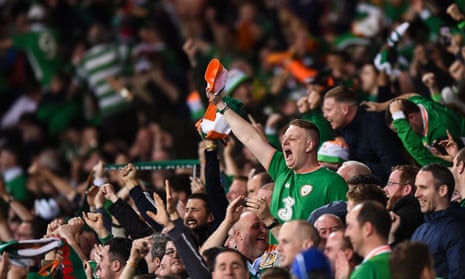It was billed as the biggest game in this country since 1993 and for Wales the sense of deja vu come the end was suffocating. Once again the World Cup finals will pass them by, just as they did 24 years ago, when Paul Bodin’s penalty kick thudded against the crossbar in their critical qualifier against Romania. This time it was the Republic of Ireland’s turn to spoil the party as Martin O’Neill’s side kept alive their own hopes of travelling to Russia next summer with the sort of victory that has become the manager’s hallmark.
Ireland may not be easy on the eye but there is something to be admired about their uncanny knack for grinding out results when it matters most. There was the victory over Germany in October 2015, the triumph against Bosnia and Herzegovina in the Euro 2016 play-offs, and that 1-0 win over Italy to reach the last 16 in that summer’s finals in France. The scalp of Wales, who had not lost a competitive match on home soil for four years, has now been added to the collection.
Chris Coleman had predicted beforehand that it would be a “toe-to-toe fight”, yet the Wales manager never bargained on James McClean, on his return from suspension, landing the knockout blow. Behind for the first time in the whole qualifying campaign, Wales found themselves in an unfamiliar position as Ireland, resilient and tenacious, executed their game-plan to perfection.
The anticipation and excitement around the occasion was huge and the memory of that stirring Welsh national anthem, sung a cappella by 30,000 home supporters, will not easily be forgotten. Wales, however, will want the game itself to quickly disappear from their minds. It was a night when nothing went right for Coleman and his players, a fact underlined by the awful goal that they conceded to hand the lead to an Ireland side who frustrated the life out of them.
Credit to O’Neill for getting his tactics spot-on. Ireland survived the early barrage, when Wales fed off the energy of their supporters, eked their way back into the game and then scored at the perfect time, just before the hour mark. From Wales’s point of view it was down to a catalogue of errors involving Wayne Hennessey, Ashley Williams and Ben Davies. From Ireland’s perspective it was reward for their dogged persistence, tireless running and a willingness to chase lost causes.

Jeff Hendrick sensed an opportunity from the moment that Hennessey rolled the ball out to Williams, who has endured a difficult start to the season with Everton. The Burnley midfielder closed Williams down, blocked the defender’s pass and with Davies seeming to think that the ball would run out of play, escaped on the right before delivering a low centre. Harry Arter’s clever dummy – a rare moment of flair in a game high on tension but low on quality – bamboozled the Wales back-line, and McClean emphatically did the rest.
In truth Wales never looked like scoring the two goals they needed to turn the game around and secure a play-off place. Joe Allen, their midfield fulcrum, had departed in the first half with concussion after he was sandwiched by McClean and David Meyler in a nasty incident that could easily have brought a yellow card. Aaron Ramsey was forced to drop deeper as a result and with all the right intentions but often the wrong result, ended up trying to do too much. As for Gareth Bale, Wales’ injured talisman was forced to play the role of cheerleader in the stand when they so badly needed him on the pitch.
The question now is where all of this leaves Coleman. He always said that he would stand down when the World Cup dream came to an end, either in Russia or Wales, yet the immediate aftermath of a devastating defeat was not the time to make an announcement on that front. The Wales manager sounded crestfallen as he talked about how a “whole nation will be mourning because again that elusive World Cup has passed us by”. Yet the truth is that whatever happens over the coming days and weeks, Coleman’s legacy in Wales is assured after taking his country to the European Championship semi-finals in the summer of 2016.
Ireland, in contrast, can continue to chase their World Cup dream. Whether they can reprise the sort of energy levels they showed in Cardiff over the course of two play-off matches that will take place in quick succession remains to be seen – there is no escaping the fact that Meyler’s suspension for the first leg is a blow. Yet O’Neill was spot-on when he said that nobody will want to face them when the draw is made next week. Ireland, as Wales can ruefully testify, are a team to avoid.

Comments (…)
Sign in or create your Guardian account to join the discussion